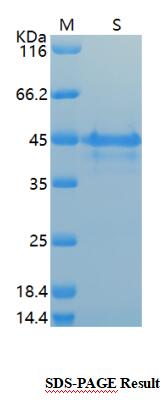Product Name :
CD138 Recombinant Protein Swiss-Prot :
P18827 Host :
E.coli Tag :
≥0.5mg/ml Amino acid Sequence :
QIVATNLPPEDQDGSGDDSDNFSGSGAGALQDITLSQQTPSTWKDTQLLTAIPTSPEPTGLEATAASTSTLPAGEGPKEGEAVVLPEVEPGLTAREQEATPRPRETTQLPTTHLASTTTATTAQEPATSHPHRDMQPGHHETSTPAGPSQADLHTPHTEDGGPSATERAAEDGASSQLPAAEGSGEQDFTFETSGENTAVVAVEPDRRNQSPVDQGATGASQGLLDRKEVLG Restriction sites :
NdeI-XhoI Background :
Syndecans are a family of type 1 transmembrane heparan sulphate proteoglycans comprising four members in mammals (SDC-1 to -4) encoded by four syndecan genes. Syndecans are involved in embryonic development, tumorigenesis, and angiogenesis. The extracellular domain harbors attachment sites for heparan sulfate and chondroitin sulfate chains, facilitating interaction with an array of proteins including a plethora of growth factors. In addition, the hydrophobic C-terminal intracellular domain can interact with proteins containing a PDZ domain. These interactions place syndecans as important integrators of membrane signaling. Syndecans undergo proteolytic cleavage causing the release of their extracellular domain (shedding), converting the membrane-bound proteins into soluble molecular effectors. Syndecan 1 (SDC1) is a specific marker for plasmacytic differentiation in hematologic disorders. This cell surface proteoglycan is also expressed in normal epithelial cells and tissues as well as various types of cancer tissues. The extracellular shed form of syndecan 1 remains soluble or accumulates in the extracellular matrix where it binds growth factors, cytokines and other extracellular matrix proteins. This binding activates signaling of bound growth factors or cytokines, which results in enhanced tumor growth, dissemination, angiogenesis, and osteolysis. As a result, the level of syndecan1 protein and its shed form may serve as prognostic factors for a list of malignancies. Soluble :
PBS, 4M Urea, PH7.4 Purification&Purity :
Transferred into competent cells and the supernatant was purified by NI column affinity chromatography and the purity is > 85% (by SDS-PAGE). Storage&Stability :
Store at 4°C short term. Aliquot and store at -20°C long term. Avoid freeze-thaw cycles. Expression vector :
pet-22b(+) BiowMW :
~26kDa Note :
For research use only, not for use in diagnostic procedure. concentration :
≥0.5mg/ml
CD138 Recombinant Protein Swiss-Prot :
P18827 Host :
E.coli Tag :
≥0.5mg/ml Amino acid Sequence :
QIVATNLPPEDQDGSGDDSDNFSGSGAGALQDITLSQQTPSTWKDTQLLTAIPTSPEPTGLEATAASTSTLPAGEGPKEGEAVVLPEVEPGLTAREQEATPRPRETTQLPTTHLASTTTATTAQEPATSHPHRDMQPGHHETSTPAGPSQADLHTPHTEDGGPSATERAAEDGASSQLPAAEGSGEQDFTFETSGENTAVVAVEPDRRNQSPVDQGATGASQGLLDRKEVLG Restriction sites :
NdeI-XhoI Background :
Syndecans are a family of type 1 transmembrane heparan sulphate proteoglycans comprising four members in mammals (SDC-1 to -4) encoded by four syndecan genes. Syndecans are involved in embryonic development, tumorigenesis, and angiogenesis. The extracellular domain harbors attachment sites for heparan sulfate and chondroitin sulfate chains, facilitating interaction with an array of proteins including a plethora of growth factors. In addition, the hydrophobic C-terminal intracellular domain can interact with proteins containing a PDZ domain. These interactions place syndecans as important integrators of membrane signaling. Syndecans undergo proteolytic cleavage causing the release of their extracellular domain (shedding), converting the membrane-bound proteins into soluble molecular effectors. Syndecan 1 (SDC1) is a specific marker for plasmacytic differentiation in hematologic disorders. This cell surface proteoglycan is also expressed in normal epithelial cells and tissues as well as various types of cancer tissues. The extracellular shed form of syndecan 1 remains soluble or accumulates in the extracellular matrix where it binds growth factors, cytokines and other extracellular matrix proteins. This binding activates signaling of bound growth factors or cytokines, which results in enhanced tumor growth, dissemination, angiogenesis, and osteolysis. As a result, the level of syndecan1 protein and its shed form may serve as prognostic factors for a list of malignancies. Soluble :
PBS, 4M Urea, PH7.4 Purification&Purity :
Transferred into competent cells and the supernatant was purified by NI column affinity chromatography and the purity is > 85% (by SDS-PAGE). Storage&Stability :
Store at 4°C short term. Aliquot and store at -20°C long term. Avoid freeze-thaw cycles. Expression vector :
pet-22b(+) BiowMW :
~26kDa Note :
For research use only, not for use in diagnostic procedure. concentration :
≥0.5mg/ml
Blocking peptide available as NCP0264P

 CD138 Recombinant Protein
CD138 Recombinant Protein 
 Datasheet
Datasheet COA
COA MSDS
MSDS SHIP
SHIP